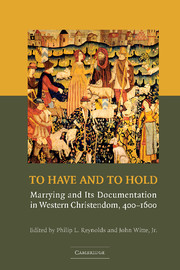Book contents
- Frontmatter
- Contents
- List of Contributors
- Preface and Acknowledgments
- List of Abbreviations
- 1 Marrying and Its Documentation in Pre-Modern Europe: Consent, Celebration, and Property
- 2 Marrying and Its Documentation in Later Roman Law
- 3 Marrying and the Tabulae Nuptiales in Roman North Africa from Tertullian to Augustine
- 4 Dotal Charters in the Frankish Tradition
- 5 Marriage and Diplomatics: Five Dower Charters from the Regions of Laon and Soissons, 1163–1181
- 6 Marriage Agreements from Twelfth-Century Southern France
- 7 Marriage Contracts in Medieval England
- 8 Marriage Contracts and the Church Courts of Fourteenth-Century England
- 9 Marrying and Marriage Litigation in Medieval Ireland
- 10 Marriage Contracts in Medieval Iceland
- 11 Contracting Marriage in Renaissance Florence
- 12 Marital Property Law as Socio-Cultural Text: The Case of Late-Medieval Douai
- 13 Marriage Contracts, Liturgies, and Properties in Reformation Geneva
- Index
13 - Marriage Contracts, Liturgies, and Properties in Reformation Geneva
Published online by Cambridge University Press: 12 September 2009
- Frontmatter
- Contents
- List of Contributors
- Preface and Acknowledgments
- List of Abbreviations
- 1 Marrying and Its Documentation in Pre-Modern Europe: Consent, Celebration, and Property
- 2 Marrying and Its Documentation in Later Roman Law
- 3 Marrying and the Tabulae Nuptiales in Roman North Africa from Tertullian to Augustine
- 4 Dotal Charters in the Frankish Tradition
- 5 Marriage and Diplomatics: Five Dower Charters from the Regions of Laon and Soissons, 1163–1181
- 6 Marriage Agreements from Twelfth-Century Southern France
- 7 Marriage Contracts in Medieval England
- 8 Marriage Contracts and the Church Courts of Fourteenth-Century England
- 9 Marrying and Marriage Litigation in Medieval Ireland
- 10 Marriage Contracts in Medieval Iceland
- 11 Contracting Marriage in Renaissance Florence
- 12 Marital Property Law as Socio-Cultural Text: The Case of Late-Medieval Douai
- 13 Marriage Contracts, Liturgies, and Properties in Reformation Geneva
- Index
Summary
Marriage was one of the hotly contested issues of the sixteenth-century Protestant Reformation and one of the first institutions to be reformed. The leading Protestant theologians – Martin Luther and Philip Melanchthon, Thomas Cranmer and William Tyndale, Martin Bucer and John Calvin – all prepared lengthy tracts on the subject in their first years of reform. Scores of leading jurists took up legal questions of marriage in their consilia and commentaries, often working under the direct inspiration of Protestant theology and theologians. Virtually every city and territory that converted to the Protestant cause in the first half of the sixteenth century had new marriage laws on the books within a decade after accepting the Reformation.
The Protestant reformers' early preoccupation with marriage was partly driven by their theology. Many of the core issues of the Reformation were implicated by the prevailing sacramental theology and canon law of marriage. The Catholic church's jurisdiction over marriage was, for the reformers, a particularly flagrant example of the church's usurpation of the magistrate's authority. The Catholic sacramental concept of marriage, on which the church predicated its jurisdiction, was for the reformers a self-serving theological fiction. The canonical prohibition on marriage of clergy and monastics stood sharply juxtaposed to Protestant doctrines of sexual sin and the Christian vocation. The canon law's long roll of impediments to betrothal and marriage, its prohibitions against complete divorce and remarriage, and its close regulations of sexuality, parenting, and education all stood in considerable tension with the reformers' understanding of the Bible.
- Type
- Chapter
- Information
- To Have and to HoldMarrying and its Documentation in Western Christendom, 400–1600, pp. 453 - 488Publisher: Cambridge University PressPrint publication year: 2007
- 3
- Cited by



